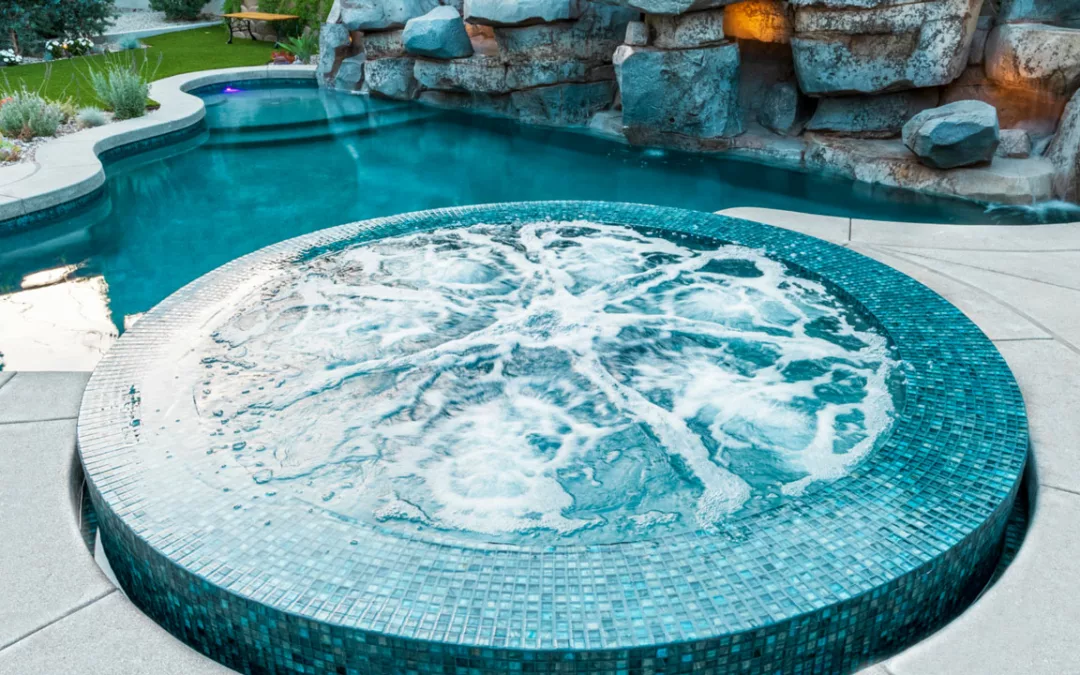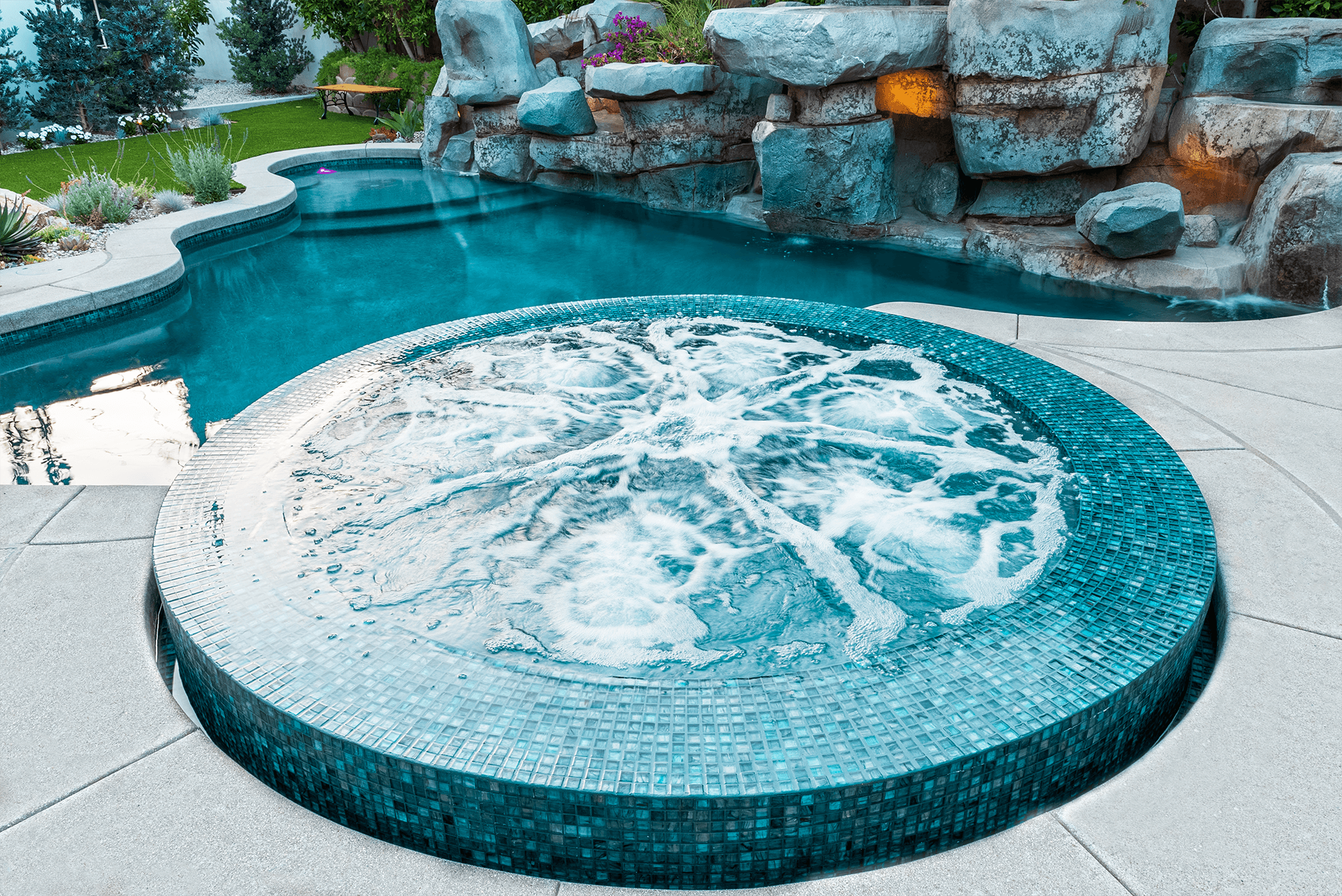If you’re ready to be a part of a world full of unparalleled luxury and timeless elegance, you’ve come to the right place.
Picture yourself stepping into your backyard, where the shimmering waters of your Los Angeles home’s swimming pool are enhanced by a mesmerizing quartz pool finish. This exquisite pool finish not only captivates the eye, but also elevates the overall aesthetic appeal of your outdoor space.
With its unrivaled beauty and exceptional durability, a quartz pool finish is the perfect choice if you’re looking to create a stunning and inviting ambiance.
The Enchanting Beauty of a Quartz Pool Finish in Your Los Angeles Pool
When it comes to creating a stunning swimming pool that becomes the focal point of your Southern California home, visual appeal is essential. This is exactly where the quartz pool finish shines, entrancing everyone who lays their eyes upon it.
A quartz pool finish boasts a mesmerizing allure with its shimmering and reflective qualities. As sunlight dances upon the water’s surface, the quartz particles embedded in the finish create a dazzling display of light and sparkle. It’s the perfect choice to add an aura of luxury and elegance to your Orange County swimming pool.
And if that isn’t enough to amaze you, you’ll be pleasantly surprised to learn that the beauty of a quartz pool goes beyond its lustrous surface. With a wide range of quartz pool finish colors available, you have the utmost freedom to make sure you get the perfect shade that best complements your home’s architecture, landscape design, and personal style.
The most common quartz pool finish colors include shades of blue quartz, red, white, gray, tan, and teal. You can even get a natural quartz finish. In other words, whether you prefer a serene turquoise, a deep navy, or a sophisticated white, there’s a quartz pool finish color made for you.
This is because quartz aggregate is crafted from meticulously tumbled, round quartz granules infused with vibrant ceramic pigments. By combining this exquisite quartz aggregate with a strong marcite base containing silica, we get a remarkable fusion of beauty and durability that together become a stunning and long-lasting quartz pool finish.
Additionally, the shimmer and reflective nature of a quartz pool finish is a true testament to the power of aesthetics in creating an alluring swimming pool, so prepare to enchant your guests with the water’s shimmering and reflective dance that transforms your pool into a work of art.
A Quartz Pool Finish Has Durability and Longevity in the Southern California Sun
Quartz, a remarkably hard material ranking high on the Mohs scale of mineral hardness, boasts exceptional scratch and chip resistance. It’s practically impervious to damage, even in the face of harsh pool chemicals and imbalances that would erode other materials.
You’ll be amazed to find that the smooth texture of quartz remains unaffected, making it an incredibly durable choice. In fact, the longevity of quartz surpasses that of many other pool finishes. It has a life span of up to 20 to 30 years, far outlasting traditional plaster, which typically requires replacement every five to seven years. This exceptional durability makes quartz an ideal option, especially in areas with hard water.
Speaking of hard water, it tends to create calcium deposits in swimming pools, leading to filter issues and unsightly stains. However, with quartz as your pool finish, you can bid farewell to these concerns. Its resistance to calcium deposits saves your filter from frequent replacements and ensures that your pool finish remains free from mild stains.
To determine whether your area has hard or soft water, it’s best to consult with a specialist in custom pool design in Orange County. They can guide you on utilizing quartz throughout your pool, resulting in an outstanding finish that stands the test of time.
A quartz pool finish has an unparalleled resilience against the harshest pool conditions, remaining steadfast and maintaining its impeccable condition. Chemicals and UV rays have nothing on a quartz pool finish.
You won’t have to worry about discoloration, fading, and deterioration as much as you would with other pool finishes. The quartz pool finish acts as a shield to protect against damaging elements, thereby preserving its original color and integrity for an extended period of time.
And don’t forget the joy of minimal maintenance. Let’s be real: Nobody wants to spend endless hours on pool maintenance. With a quartz pool finish, you can enjoy the benefits of a durable surface while minimizing your maintenance chores.
Its smooth and nonporous nature makes it resistant to stains and algae growth, making the cleaning process that much easier and reducing the frequency of required maintenance. You can spend more time relaxing and less time worrying about the upkeep of your Orange County swimming pool.
Here’s to celebrating the exceptional durability and longevity of your quartz pool finish in your Los Angeles home’s swimming pool.
This pool finish can truly withstand the test of time and continue to shine in all its glory for years to come. You, too, can experience the strength and resilience of quartz, surpassing expectations and providing a stunning pool finish that remains immaculate for years to come.
Incorporating Quartz Aggregate Into an Existing Los Angeles Swimming Pool
If you’re thinking of updating your current pool finish, making the switch to quartz brings a multitude of benefits. The beauty of quartz lies in its nonreactive nature, which means it seamlessly integrates with various pool materials such as plaster and gunite.
One notable advantage of using quartz aggregate is the ease of repair. If any issues arise, the process is straightforward. Simply sand the affected area to remove stains or smooth out roughness, then reapply the quartz finish. It’s a hassle-free solution that ensures your pool maintains its beautiful appearance.
As for color-matching, worry not. Quartz manufacturers provide prepackaged factory blends that offer a wide range of quartz pool finish colors. This ensures you’ll find a suitable finish blend that perfectly complements your pool, eliminating any concerns about mismatched colors.
You’ll unlock a world of possibilities when making the switch to a quartz pool finish. From seamless integration and easy repairs to an array of quartz finish colors, you won’t regret updating your Los Angeles swimming pool to quartz.
Comfort and Safety in Your Los Angeles Swimming Pool
Rest assured that when it comes to the comfort of your Southern California swimming pool, the quartz pool finish doesn’t disappoint. Its smooth texture creates a calming and satisfying sensation underfoot, allowing you to glide through the water with absolute ease.
But comfort isn’t the only thing a quartz pool finish offers. Safety is of the utmost importance in any Orange County swimming pool — and a quartz pool finish takes it seriously. This finish is designed to provide a secure surface that minimizes the risk of slips and falls.
With a carefully crafted texture that offers optimal traction, you can enjoy pool activities with confidence and peace of mind. Whether swimming, playing games, or simply relaxing by the water’s edge, you can trust that the quartz pool finish will help keep you and your loved ones safe.
Is a Quartz Pool Finish Right for Your Orange County Swimming Pool?
Indulging in a quartz pool finish has many benefits, but is it the right pool finish for you? It’s essential to consider the financial aspect when choosing a quartz pool finish. While it offers remarkable beauty and durability, it’s crucial to evaluate the investment required for this premium pool finish.
By carefully assessing your budget and comparing it with the long-term benefits, you can make an informed decision that aligns with your financial goals. Installing a quartz pool finish demands precision and expertise that only a pool professional can offer.
To ensure a flawless and durable result, it’s highly recommended to seek professional assistance. Experienced pool remodeling experts possess the necessary skills and knowledge to handle the intricacies of the installation process, guaranteeing a smooth and seamless application that showcases the true beauty of the quartz pool finish in all of its glory.
Now, let’s dive into a couple of factors to keep in mind regarding the quartz pool finish. In hotter climates, this finish has the potential to retain heat, which could lead to slightly warmer water temperatures. But fret not. You can easily tackle this by ensuring your pool has proper insulation and efficient water circulation, keeping the water at a comfortable level for all swimmers to enjoy.
To maintain the pristine appearance, it’s essential to be aware of certain issues that could put it at risk. Improper water chemistry and prolonged exposure to sunlight can pose potential challenges. However, you can easily stay on top of this by regularly maintaining and monitoring your pool’s water chemistry. By doing so, you can prevent any unwelcome discoloration and ensure that your quartz pool finish stays looking fresh and beautiful for years to come.
Choosing the Right Los Angeles and Orange County Pool Remodeling Company
By weighing the pros and cons, you can make an informed decision on whether a quartz pool finish is the perfect fit for your swimming pool. Just remember to take the financial investment into account, consider the benefits of professional pool installation, keep an eye on heat retention concerns, and implement best maintenance practices.
You can soon confidently embrace the captivating beauty and long-lasting durability of your quartz pool finish, making every moment in your pool a delightful experience. A quartz pool finish can transform your Los Angeles swimming pool into a masterpiece. Its shimmering and reflective surface, combined with a wide selection of quartz pool finish colors, creates a visually stunning and inviting environment.
You can enjoy a pool finish that withstands the rigors of the Southern California sun and maintains its pure condition. A quartz pool finish also enhances comfort and safety, providing a smooth texture underfoot and a secure surface for worry-free swimming and recreation. By choosing quartz for your pool remodeling project, you can achieve a remarkable combination of beauty, durability, and functionality.
All in all, quartz can be an excellent option when it comes to remodeling your pool or installing it for your first pool, and it offers a host of benefits that make it worth considering.
Turn Your Dream Into a Reality With Calimingo Pools!
We can help you turn your fantasy of having a stunning quartz pool finish into a reality with our expert installation services. Our custom pool-building team has years of experience to bring your vision to life.
Let us guide you in the next steps in the decision-making process. Contact us at 714-235-3294.
Turn your dream into a reality.


